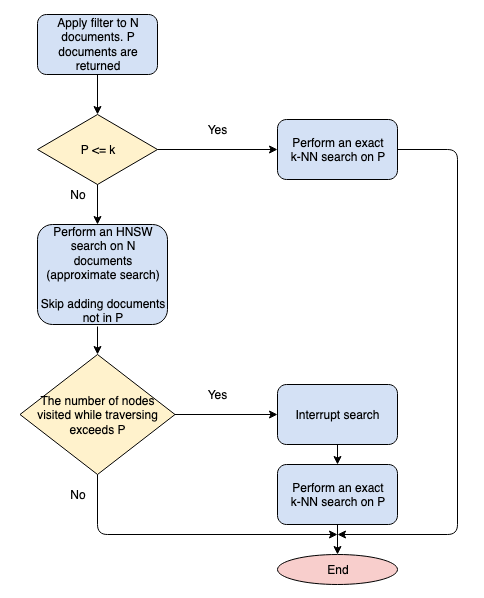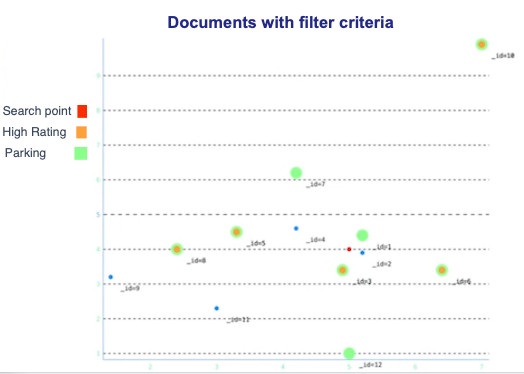You're viewing version 2.7 of the OpenSearch documentation. This version is no longer maintained. For the latest version, see the current documentation. For information about OpenSearch version maintenance, see Release Schedule and Maintenance Policy.
k-NN search with filters
To refine k-NN results, you can filter a k-NN search using one of the following methods:
-
Scoring script filter: This approach involves pre-filtering a document set and then running an exact k-NN search on the filtered subset. It does not scale for large filtered subsets.
-
Boolean filter: This approach runs an approximate nearest neighbor (ANN) search and then applies a filter to the results. Because of post-filtering, it may return significantly fewer than
kresults for a restrictive filter. -
Lucene k-NN filter: This approach applies filtering during the k-NN search, as opposed to before or after the k-NN search, which ensures that
kresults are returned. You can only use this method with the Hierarchical Navigable Small World (HNSW) algorithm implemented by the Lucene search engine in k-NN plugin versions 2.4 and later.
Filtered search optimization
Depending on your dataset and use case, you might be more interested in maximizing recall or minimizing latency. The following table provides guidance on various k-NN search configurations and the filtering methods used to optimize for higher recall or lower latency. The first three columns of the table provide several example k-NN search configurations. A search configuration consists of:
- The number of documents in an index, where one OpenSearch document corresponds to one k-NN vector.
- The percentage of documents left in the results after filtering. This value depends on the restrictiveness of the filter that you provide in the query. The most restrictive filter in the table returns 2.5% of documents in the index, while the least restrictive filter returns 80% of documents.
- The desired number of returned results (k).
Once you’ve estimated the number of documents in your index, the restrictiveness of your filter, and the desired number of nearest neighbors, use the following table to choose a filtering method that optimizes for recall or latency.
| Number of documents in an index | Percentage of documents the filter returns | k | Filtering method to use for higher recall | Filtering method to use for lower latency |
|---|---|---|---|---|
| 10M | 2.5 | 100 | Scoring script | Scoring script |
| 10M | 38 | 100 | Lucene filter | Boolean filter |
| 10M | 80 | 100 | Scoring script | Lucene filter |
| 1M | 2.5 | 100 | Lucene filter | Scoring script |
| 1M | 38 | 100 | Lucene filter | Lucene filter/scoring script |
| 1M | 80 | 100 | Boolean filter | Lucene filter |
Scoring script filter
A scoring script filter first filters the documents and then uses a brute-force exact k-NN search on the results. For example, the following query searches for hotels with a rating between 8 and 10, inclusive, that provide parking and then performs a k-NN search to return the 3 hotels that are closest to the specified location:
POST /hotels-index/_search
{
"size": 3,
"query": {
"script_score": {
"query": {
"bool": {
"filter": {
"bool": {
"must": [
{
"range": {
"rating": {
"gte": 8,
"lte": 10
}
}
},
{
"term": {
"parking": "true"
}
}
]
}
}
}
},
"script": {
"source": "knn_score",
"lang": "knn",
"params": {
"field": "location",
"query_value": [
5.0,
4.0
],
"space_type": "l2"
}
}
}
}
}
Boolean filter with ANN search
A Boolean filter consists of a Boolean query that contains a k-NN query and a filter. For example, the following query searches for hotels that are closest to the specified location and then filters the results to return hotels with a rating between 8 and 10, inclusive, that provide parking:
POST /hotels-index/_search
{
"size": 3,
"query": {
"bool": {
"filter": {
"bool": {
"must": [
{
"range": {
"rating": {
"gte": 8,
"lte": 10
}
}
},
{
"term": {
"parking": "true"
}
}
]
}
},
"must": [
{
"knn": {
"location": {
"vector": [
5,
4
],
"k": 20
}
}
}
]
}
}
}
The response includes documents containing the matching hotels:
{
"took" : 95,
"timed_out" : false,
"_shards" : {
"total" : 1,
"successful" : 1,
"skipped" : 0,
"failed" : 0
},
"hits" : {
"total" : {
"value" : 5,
"relation" : "eq"
},
"max_score" : 0.72992706,
"hits" : [
{
"_index" : "hotels-index",
"_id" : "3",
"_score" : 0.72992706,
"_source" : {
"location" : [
4.9,
3.4
],
"parking" : "true",
"rating" : 9
}
},
{
"_index" : "hotels-index",
"_id" : "6",
"_score" : 0.3012048,
"_source" : {
"location" : [
6.4,
3.4
],
"parking" : "true",
"rating" : 9
}
},
{
"_index" : "hotels-index",
"_id" : "5",
"_score" : 0.24154587,
"_source" : {
"location" : [
3.3,
4.5
],
"parking" : "true",
"rating" : 8
}
}
]
}
}
Lucene k-NN filter implementation
k-NN plugin version 2.2 introduced support for running k-NN searches with the Lucene engine using HNSW graphs. Starting with version 2.4, which is based on Lucene version 9.4, you can use Lucene filters for k-NN searches.
When you specify a Lucene filter for a k-NN search, the Lucene algorithm decides whether to perform an exact k-NN search with pre-filtering or an approximate search with modified post-filtering. The algorithm uses the following variables:
- N: The number of documents in the index.
- P: The number of documents in the document subset after the filter is applied (P <= N).
- k: The maximum number of vectors to return in the response.
The following flow chart outlines the Lucene algorithm.

For more information about the Lucene filtering implementation and the underlying KnnVectorQuery, see the Apache Lucene documentation.
Using a Lucene k-NN filter
Consider a dataset that includes 12 documents containing hotel information. The following image shows all hotels on an xy coordinate plane by location. Additionally, the points for hotels that have a rating between 8 and 10, inclusive, are depicted with orange dots, and hotels that provide parking are depicted with green circles. The search point is colored in red:

In this example, you will create an index and search for the three hotels with high ratings and parking that are the closest to the search location.
Step 1: Create a new index
Before you can run a k-NN search with a filter, you need to create an index with a knn_vector field. For this field, you need to specify lucene as the engine and hnsw as the method in the mapping.
The following request creates a new index called hotels-index with a knn-filter field called location:
PUT /hotels-index
{
"settings": {
"index": {
"knn": true,
"knn.algo_param.ef_search": 100,
"number_of_shards": 1,
"number_of_replicas": 0
}
},
"mappings": {
"properties": {
"location": {
"type": "knn_vector",
"dimension": 2,
"method": {
"name": "hnsw",
"space_type": "l2",
"engine": "lucene",
"parameters": {
"ef_construction": 100,
"m": 16
}
}
}
}
}
}
Step 2: Add data to your index
Next, add data to your index.
The following request adds 12 documents that contain hotel location, rating, and parking information:
POST /_bulk
{ "index": { "_index": "hotels-index", "_id": "1" } }
{ "location": [5.2, 4.4], "parking" : "true", "rating" : 5 }
{ "index": { "_index": "hotels-index", "_id": "2" } }
{ "location": [5.2, 3.9], "parking" : "false", "rating" : 4 }
{ "index": { "_index": "hotels-index", "_id": "3" } }
{ "location": [4.9, 3.4], "parking" : "true", "rating" : 9 }
{ "index": { "_index": "hotels-index", "_id": "4" } }
{ "location": [4.2, 4.6], "parking" : "false", "rating" : 6}
{ "index": { "_index": "hotels-index", "_id": "5" } }
{ "location": [3.3, 4.5], "parking" : "true", "rating" : 8 }
{ "index": { "_index": "hotels-index", "_id": "6" } }
{ "location": [6.4, 3.4], "parking" : "true", "rating" : 9 }
{ "index": { "_index": "hotels-index", "_id": "7" } }
{ "location": [4.2, 6.2], "parking" : "true", "rating" : 5 }
{ "index": { "_index": "hotels-index", "_id": "8" } }
{ "location": [2.4, 4.0], "parking" : "true", "rating" : 8 }
{ "index": { "_index": "hotels-index", "_id": "9" } }
{ "location": [1.4, 3.2], "parking" : "false", "rating" : 5 }
{ "index": { "_index": "hotels-index", "_id": "10" } }
{ "location": [7.0, 9.9], "parking" : "true", "rating" : 9 }
{ "index": { "_index": "hotels-index", "_id": "11" } }
{ "location": [3.0, 2.3], "parking" : "false", "rating" : 6 }
{ "index": { "_index": "hotels-index", "_id": "12" } }
{ "location": [5.0, 1.0], "parking" : "true", "rating" : 3 }
Step 3: Search your data with a filter
Now you can create a k-NN search with filters. In the k-NN query clause, include the point of interest that is used to search for nearest neighbors, the number of nearest neighbors to return (k), and a filter with the restriction criteria. Depending on how restrictive you want your filter to be, you can add multiple query clauses to a single request.
The following request creates a k-NN query that searches for the top three hotels near the location with the coordinates [5, 4] that are rated between 8 and 10, inclusive, and provide parking:
POST /hotels-index/_search
{
"size": 3,
"query": {
"knn": {
"location": {
"vector": [
5,
4
],
"k": 3,
"filter": {
"bool": {
"must": [
{
"range": {
"rating": {
"gte": 8,
"lte": 10
}
}
},
{
"term": {
"parking": "true"
}
}
]
}
}
}
}
}
}
The response returns the three hotels that are nearest to the search point and have met the filter criteria:
{
"took" : 47,
"timed_out" : false,
"_shards" : {
"total" : 1,
"successful" : 1,
"skipped" : 0,
"failed" : 0
},
"hits" : {
"total" : {
"value" : 3,
"relation" : "eq"
},
"max_score" : 0.72992706,
"hits" : [
{
"_index" : "hotels-index",
"_id" : "3",
"_score" : 0.72992706,
"_source" : {
"location" : [
4.9,
3.4
],
"parking" : "true",
"rating" : 9
}
},
{
"_index" : "hotels-index",
"_id" : "6",
"_score" : 0.3012048,
"_source" : {
"location" : [
6.4,
3.4
],
"parking" : "true",
"rating" : 9
}
},
{
"_index" : "hotels-index",
"_id" : "5",
"_score" : 0.24154587,
"_source" : {
"location" : [
3.3,
4.5
],
"parking" : "true",
"rating" : 8
}
}
]
}
}
Note that there are multiple ways to construct a filter that returns hotels that provide parking, for example:
- A
termquery clause in theshouldclause - A
wildcardquery clause in theshouldclause - A
regexpquery clause in theshouldclause - A
must_notclause to eliminate hotels withparkingset tofalse.
The following request illustrates these four different ways of searching for hotels with parking:
POST /hotels-index/_search
{
"size": 3,
"query": {
"knn": {
"location": {
"vector": [ 5.0, 4.0 ],
"k": 3,
"filter": {
"bool": {
"must": {
"range": {
"rating": {
"gte": 1,
"lte": 6
}
}
},
"should": [
{
"term": {
"parking": "true"
}
},
{
"wildcard": {
"parking": {
"value": "t*e"
}
}
},
{
"regexp": {
"parking": "[a-zA-Z]rue"
}
}
],
"must_not": [
{
"term": {
"parking": "false"
}
}
],
"minimum_should_match": 1
}
}
}
}
}
}